6 start with F start with F
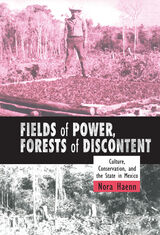
In Fields of Power, Forests of Discontent, Nora Haenn questions the rise and fall of this conservation program to examine conservation at the intersection of national-international agendas and local political-economic interests. While other assessments of such programs have typically focused on why they do or do not succeed, Haenn instead considers conservation’s encounter with people’s everyday lives—and how those experiences affect environmental management.
Haenn explores conservation and development from two perspectives: first regionally, to look at how people used conservation to create a new governing entity on a tropical frontier once weakly under national rule; then locally, focusing on personal histories and aspects of community life that shape people's daily lives, farming practices, and immersion in development programs—even though those programs ultimately fail to resolve economic frustrations. She identifies how key political actors, social movements, and identity politics contributed to the instability of the Calakmul alliance. Drawing on extensive interviews with Reserve staff, including its director, she connects regional trends to village life through accounts of disputes at ejido meetings and the failure of ejido development projects.
In the face of continued difficulty in creating a popular conservation in Calakmul, Haenn uses lessons from people's lives—history, livelihood, village organization, expectations—to argue for a "sustaining conservation," one that integrates social justice and local political norms with a new, more robust definition of conservation. In this way, Fields of Power, Forests of Discontent goes beyond local ethnography to encourage creative discussion of conservation's impact on both land and people.
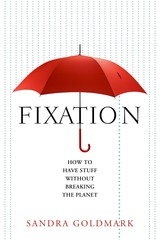
Since founding Fixup, a pop-up repair shop that brought her coverage in The New York Times, Salon, New York Public Radio, and more, Sandra Goldmark has become a leader in the movement to demand better “stuff.” She doesn’t just want to help us clear clutter—she aims to move us away from throwaway culture, to teach us to reuse and repurpose more thoughtfully, and to urge companies to produce better stuff. Although her goal is ambitious, the solution to getting there is surprisingly simple and involves all of us: have good stuff, not too much, mostly reclaimed, care for it, and pass it on.
Fixation charts the path to the next frontier in the health, wellness, and environmental movements—learning how to value stewardship over waste. We can choose quality items designed for a long lifecycle, commit to repairing them when they break, and shift our perspective on reuse and “preowned” goods. Together, we can demand that companies get on board. Goldmark shares examples of forward-thinking companies that are thriving by conducting their businesses sustainably and responsibly.
Passionate, wise, and practical, Fixation offers us a new understanding of stuff by building a value chain where good design, reuse, and repair are the status quo.
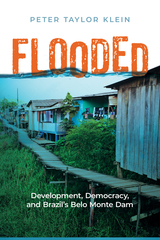
Flooded provides insights into the little-known effects of these approaches through a close examination of Brazil’s Belo Monte hydroelectric facility. After three decades of controversy over damming the Xingu River, a tributary of the Amazon, the dam was completed in 2019 under the left-of-center Workers’ Party, becoming the world’s fourth largest. Billions of dollars for social welfare programs accompanied construction. Nonetheless, the dam brought extensive social, political, and environmental upheaval to the region. The population soared, cost of living skyrocketed, violence spiked, pollution increased, and already overextended education and healthcare systems were strained. Nearly 40,000 people were displaced and ecosystems were significantly disrupted. Klein tells the stories of dam-affected communities, including activists, social movements, non-governmental organizations, and public defenders and public prosecutors. He details how these groups, as well as government officials and representatives from private companies, negotiated the upheaval through protests, participating in public forums for deliberation, using legal mechanisms to push for protections for the most vulnerable, and engaging in myriad other civic spaces. Flooded provides a rich ethnographic account of democracy and development in the making. In the midst of today’s climate crisis, this book showcases the challenges and opportunities of meeting increasing demands for energy in equitable ways.
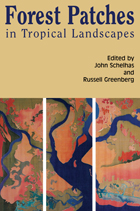
This volume brings together world-renowned scientists and conservationists to address the biological and socio-economic value of forest remnants and to examine practical efforts to conserve those remnants. An outgrowth of a year-long study by the policy program at the Smithsonian Migratory Bird Center, Forest Patches in Tropical Landscapes provides a broad overview of theory and practice, and will help foster both interdisciplinary research and more effective approaches to tropical conservation and development.
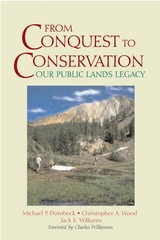
From Conquest to Conservation is a visionary new work from three of the nation’s most knowledgeable experts on public lands. As chief of the Forest Service, Mike Dombeck became a lightning rod for public debate over issues such as the management of old-growth forests and protecting roadless areas. Dombeck also directed the Bureau of Land Management from 1994 to 1997 and is the only person ever to have led the two largest land management agencies in the United States. Chris Wood and Jack Williams have similarly spent their careers working to steward public resources, and the authors bring unparalleled insight into the challenges facing public lands and how those challenges can be met.
Here, they examine the history of public lands in the United States and consider the most pressing environmental and social problems facing public lands. Drawing heavily on fellow Forest Service employee Aldo Leopold’s land ethic, they offer specific suggestions for new directions in policy and management that can help maintain and restore the health, diversity, and productivity of public land and water resources, both now and into the future.
Also featured are lyrical and heartfelt essays from leading writers, thinkers, and scientists— including Bruce Babbitt, Rick Bass, Patricia Nelson Limerick, and Gaylord Nelson—about the importance of public lands and the threats to them, along with original drawings by William Millonig.
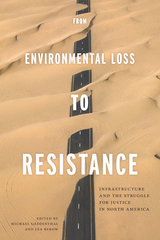
In this new collection, a range of contributors—among them researchers, practitioners, organizers, and activists—explore the ways in which people counter or cope with feelings of despair, leverage action for positive change, and formulate pathways to achieve environmental justice goals. These essays pay particular attention to issues of race, class, economic liberalization, and geography; place contemporary environmental struggles in a critical context that emphasizes justice, connection, and reconciliation; and raise important questions about the challenges and responses that concern those pursuing environmental justice.
Contributors include the volume editors, Carol J. Adams, Randall Amster, Jan Inglis, Eileen Delehanty Pearkes, Zoë Roller, and Michael Truscello.
READERS
Browse our collection.
PUBLISHERS
See BiblioVault's publisher services.
STUDENT SERVICES
Files for college accessibility offices.
UChicago Accessibility Resources
home | accessibility | search | about | contact us
BiblioVault ® 2001 - 2024
The University of Chicago Press









